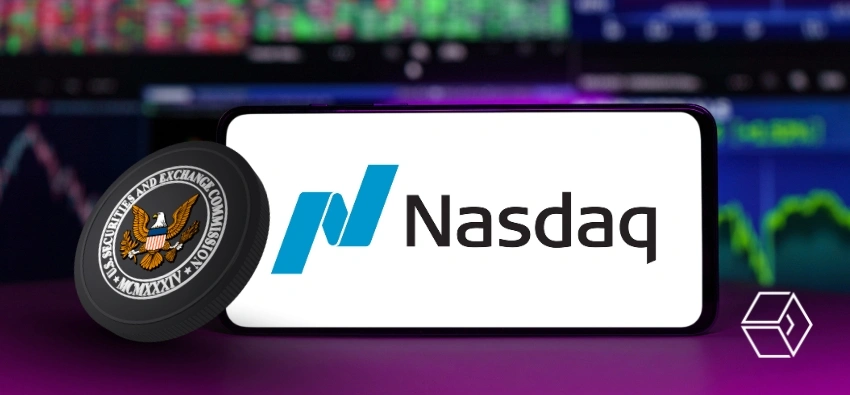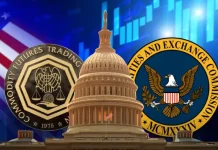
- Nasdaq filed a proposal with the SEC to allow trading of tokenized securities.
- The move could make Nasdaq the first U.S. exchange to integrate blockchain settlement.
- Supporters highlight liquidity benefits, while critics warn of systemic risks and regulatory hurdles.
Nasdaq is taking a bold step that could reshape Wall Street’s future, filing a proposal with U.S. regulators to allow trading of tokenized securities on its main market. The exchange wants to enable listed stocks and exchange-traded products to trade in either traditional form or tokenized versions, placing blockchain technology inside one of the world’s most regulated financial systems.
If approved, this would be the first instance of tokenized securities operating on a major U.S. stock exchange, setting the stage for deeper integration of blockchain settlement into mainstream financial markets. The timing reflects rising global demand for tokenized assets and growing political appetite for reform of crypto-related rules under the Trump administration.
Nasdaq Filing Shows How Tokenized Securities Could Shift Trading into a Blockchain-Based Settlement System
Nasdaq’s submission to the Securities and Exchange Commission is more than a technical amendment, since it touches how stocks are defined, issued, and ultimately settled in U.S. markets. The proposal explicitly states that tokenization can be introduced without dismantling the national market system, which the exchange argues still offers robust investor protections.
Executives believe this approach preserves current safeguards while still creating room for digital asset innovation within tightly regulated structures. By working through established frameworks rather than requesting sweeping exemptions, Nasdaq is presenting tokenization as an extension of current systems instead of an untested gamble.
Rising Investor Demand For Tokenized Assets is Pushing Banks and Exchanges Toward Blockchain Adoption
Demand for tokenized assets is increasing across financial markets, with proponents suggesting such instruments could improve liquidity and transparency. Coinbase has already petitioned the SEC for approval to offer tokenized equities, while major banks such as Citi and Bank of America have studied tokenized stablecoins and other digital asset models.
Supporters argue this momentum shows tokenization is not just a passing phase of crypto speculation but a structural development that could influence how capital markets operate. By moving early, Nasdaq signals its intent to remain at the front of these transformations rather than watching them from the sidelines.
Nasdaq Emphasizes Investor Protections While Critics Caution that Tokenized Markets Could Create Systemic Risks
In its filing, Nasdaq made clear that tokenization should still function under the current safeguards of the U.S. market system. The exchange warned that granting blanket exemptions from investor protections would not serve markets well and insisted tokenization could be accommodated without discarding existing rules.
Some analysts caution that rushing into tokenized markets early without strict regulations might breed trouble across financial systems. SEC Commissioner Hester Peirce reiterated that tokenized securities laws are already set in motion.
This debate now rests in the hands of regulators, whose decision could determine whether tokenization incorporates itself in Wall Street’s foundation or remains confined to smaller platforms.
Balancing Innovation With Investor Protections
Nasdaq is careful to stress that investor protections will remain at the core of its plan. The exchange insists tokenization can be adopted without weakening the safeguards of the U.S. market system. Surveillance, compliance, and disclosure standards would all continue to apply.
Critics, however, caution that rushing into tokenized markets could carry risks. Concerns include potential market fragmentation, systemic vulnerabilities, or loopholes created by immature regulatory oversight. Still, Nasdaq’s incremental approach to integrating tokenization within existing legal and operational frameworks may help reduce those fears.
A Defining Moment for Wall Street
This proposal is more than a minor rule change. If regulators approve it, tokenized trading could redefine how ownership of stocks and exchange-traded products is recorded, settled, and transferred. For the first time, blockchain technology would move from being a fringe experiment to a regulated standard at the very heart of U.S. capital markets.
Nasdaq’s filing signals that tokenization is not just an abstract idea but a real transformation underway. Whether the SEC gives its approval may determine if blockchain becomes a permanent part of Wall Street’s foundation—or stays confined to smaller, less regulated platforms.



